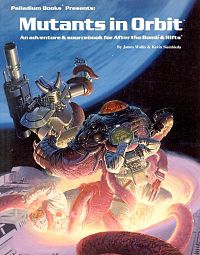- Mutants in Orbit
-
Mutants in Orbit 
Front cover of Mutants in Orbit
role-playing game sourcebookAuthor(s) James Wallis, Kevin Siembieda Illustrator Michael Gustovich, Newton Ewell, Kevin Long, Kevin Siembieda Cover artist Keith Parkinson Country United States Language English Series After the Bomb and Rifts RPGs Genre(s) Post-apocalyptic science fiction Publisher Palladium Books Publication date March 1992 Media type Print (Paperback) Pages 112 ISBN 0916211487 Preceded by Mutants in Avalon Followed by After the Bomb (2nd edition) Mutants in Orbit is an adventure and sourcebook for the After the Bomb and Rifts role-playing games, authored by James Wallis and Kevin Siembieda. It was released by Palladium Books in March 1992. The book deals with life of space colonies. The setting is on the same time scale as the After the Bomb and Rifts, only from the space colonies' point of view, but is in no way limited to that use.
Contents
Creation
The same standard creation process for the attributes then a slight variation on the animal types, mostly those that would have been either pets or test subjects.
Occupational Character Classes (O.C.C's)
These reference some specialized skills needed for surviving in space and those few skills flow the O.C.C's for ease of use. Note that this is just a supplement and that either After the Bomb, Teenage Mutant Ninja Turtles & Other Strangeness, or Rifts core rulebooks are needed to get the basic information not found here.
Powers
Besides becoming more humanoid and intelligent, the animals in space were subject to stronger doses of cosmic radiation and probably developed an extraordinary ability or more, but not without a side effect. It's these side effects that made the outcasts what they are, but they are also more enhanced than others, generally speaking. If you happen to get the supplement Transdimensional Teenage Mutant Ninja Turtles you will be able to mutate, or de-evolve, a normal human. These can be basis for LGM's (Little Green Men).
Life in orbit
- The Sino-Japanese station: Also known as the Graveyard, it was cut up by a killer satellite during the Flash and now is a cloud of dust. For the those in the Zone, this was an easy but desperate choice, see necessities of life for a bit of this. The surviving stations, ships and various other remnants that haven't seen their orbit decay have been utilized to the mutual benefit of the entire community.
- Freedom Station: A rough equivalent to America and its inhabitants, called Yankers, are open and friendly.
- Laika Station: The Russian station is more a throwback to the old Soviet days and tend to be xenophobic to all but Yuro Station, the Moon and a few close Independents.
- Yuro Station: The European collective once was a common entity but they have since returned to more monarchist styles and retreated into their various areas.
- Outcast Station: It isn't really a station in the usual sense. More like a leper colony than anything, this is where those with the most extreme of mutations go or live. Built out of whatever can be salvaged, it offers little protection from the rigors of space except in the very heart of the station.
- The Moon: Largest concentration of human life in the Zone. They are seriously territorial and they tend to shoot a lot then try to ask questions. Most just stopped asking questions altogether.
- Earth: No one in space will ever dream of setting foot on Earth, since most are second and possibly third generation spacers.
- Mars Base: Nothing has been heard from them and most figure they died out fairly quickly. No one has ever had reason to think otherwise.
- Freebooters, miners and the Network: Freebooters, scavengers and ship owners are the ones that make life in space possible as much as Miners who dig through asteroids for the ice and minerals. The Network is the organized crime branch for the orbital community.
Necessities of space life
No one lives long in space without air or water and no one prospers without raw materials. Luckily there's an asteroid belt nearby and more than a few space craft have survived. You also need to protect yourself and the cargo from raiders/pirates and even if you have a spiffy power like lightning, you can't use it in hard space without freezing solid – common tactic called being "spaced". So clothing, weapons and tools common for survival can be found toward the back before the adventure scenario.
Rifts
Conversions of the above areas with the following additions: the presence KLS Corporation on Freedom Station, CAN Republic on the Moon, and stats for the Mark III, IV and V Glitter Boys, VRRDS Samurai and Mikado robots.
Palladium Books Active role-playing game series Anime and ComicsFantasyHorrorMartial Arts and MilitaryPost-apocalypticSuperheroOut of print role-playing games Anime and ComicsMacross II (1993–1996) · Robotech (1986–1998) · Robotech II: The Sentinels (1988–1995) · Teenage Mutant Ninja Turtles & Other Strangeness (1985–1999)FantasyHistoricalScience FictionSee also Categories:- 1992 books
- After the Bomb (role-playing game)
- Rifts (role-playing game)
Wikimedia Foundation. 2010.
